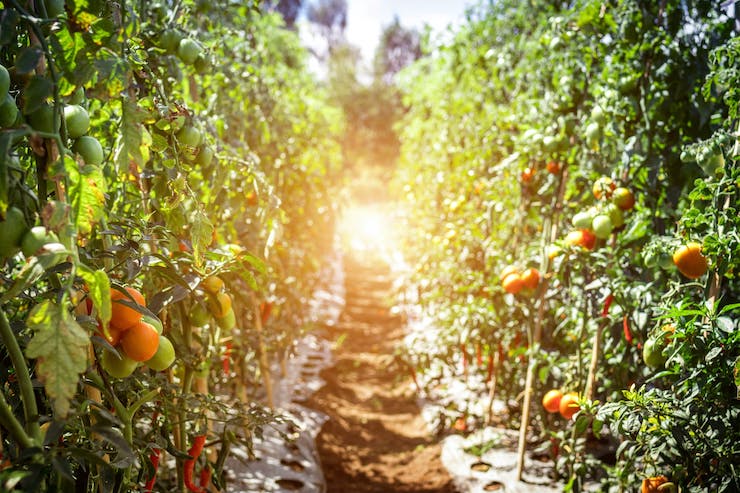Farmers Using Drones to Inject Medical Patches to Infected Tomato Crops Via a Drone’s Dart Gun

Anyone who has ever tended to a garden knows how much satisfaction you can get out of harvesting and enjoying your own produce. With lots of care and attention you can have succulent tomatoes and cucumbers, crisp greens and peppers, a true bounty of goodness. But just as easily, your plants can become diseased and you get left with slim pickings. In a small garden there are usually ways of treating and preventing crop disease. On a large scale farm maintaining plant health can become a major daily undertaking. If one plant gets sick, it can quickly infect nearby plants, possibly destroying an entire crop.
To prevent this from happening agriculturists will spray crops with chemicals that give plants protection from pests, extra nutrients, and medications if necessary. Over the last few years many farms have begun to rely on drones to get this job done. A drone can chemically treat an entire farm in a fraction of the time it would have taken to do manually. Not only do the drones save time, but they also help keep people safe from having to spray chemicals that while safe to apply on plants for consumption, are not safe for inhalation. Drones are also being used to monitor crop health.
A drone can be flown over a vast farm to collect video and thermal data on crops. This data can then be analyzed to determine if crops are being properly hydrated, are ready for harvesting, being attacked by pests, or have contracted a disease. If a farmer sees that some of it’s plants have become infected they have to act quickly to save their crop. The choice is to either remove that plant and hope the disease hasn’t spread, or they can treat it with medications, just like a doctor would treat a human with an infection. Inspired by new means of delivering medications to human patients, as well as agricultural drones, a team from the Massachusetts Institute of Technology has developed a new means of treating infected plants.
This past April MIT graduate student Yunteng Cao and post graduate students Eugene Lim, and Menglong Xu released a paper under the guidance of Professors Benedetto Marelli and Jing-Ke-Weng. The paper outlines a new way of delivering vital medications to plants to sustain healthy crops. The paper points out that as the world’s population is estimated to exceed 9.7 billion people by the year 2050, the need for increased healthy crop production is imminent. This would mean finding a way to ensure that each plant has the optimal chance of survival and production to feed the world. While agriculturalists have means of treating crops for infections, these means are not fool proof. The majority of pesticides or medications administered to crops end up in the surrounding soil and water, not entirely treating the plants at the source of a possible infection.
Recently doctors have created a bandaid like patch with micro needles that can be placed on a patient’s skin to painlessly and gradually release medication into the blood stream. Yunteng and his co-researchers took this principle and applied it to a patch to directly treat an infected plant. Made of hardened silk the patch is attached to a plant stem. The silk barbs, or micro needles filled with medicine dissolve to send the needed nutrients or medication to the plant precisely. Yunteng and his team have named this new patch the “phytoinjector”. Using phytoinjectors of varying sizes the team attached them to the delicate stems of a tomato plant and the dense bark of an orange tree.
The research, all of which took place in a controlled lab, proved that the phytoinjector would work to treat various types of plants precisely. However, having to hand place a
phytoinjector on individual plants is not a realistic treatment plan for a major farm. Knowing how beneficial drones have become in agricultural management, Yunteng decided to use a drone to attach the phytoinjector to the stem of a tomato plant. Taking an off the shelf drone, the team attached a remote controlled dart gun to it’s underside. Flying the drone over to the plant, Yunteng remotely shot the phytoinjector from the dart gun towards the thin stem of the tomato plant. He spent weeks trying the drone applicator. “Most times I just missed it,” he said. But when the dart, fired from the hovering drone finally made contact with the plant, it was an eureka moment.
Not only had the team developed a direct means of treating diseased plants, they had found a way to one day administer the “shot” on a large, effective scale. However, Yunteng did admit that “For in-field automated large-scale application, there is a long way to go and we cannot provide an estimate of when the application of the phytoinjector may become possible.” Though with the advancement of precision drones, finding one that can accurately shoot a phytoinjector into plants on a farm could be highly realistic.
|